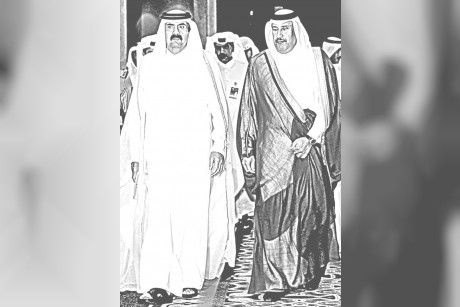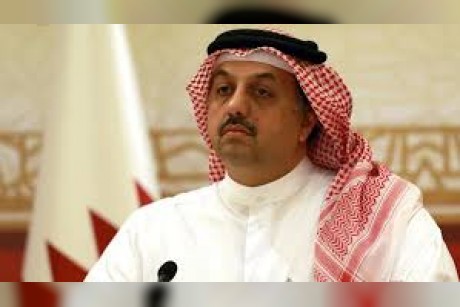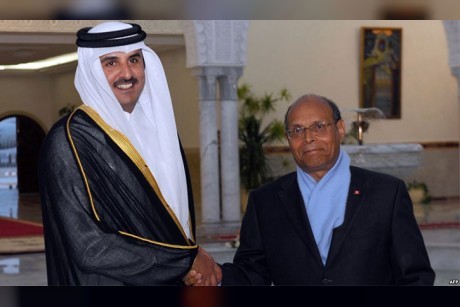It is just over two years since the Anti-Terror Quartet (Saudi Arabia, Bahrain, the UAE and Egypt) severed relations with Qatar and imposed a trade, travel and diplomatic boycott. There are no signs that this boycott will be lifted any time soon.
Although this rift has endured for so long that it has become the “new normal,” it is of vital importance for the Arab Quartet to constantly remind the public of the truth about how it came about; and to make it clear that despite the extensive and expensive efforts of Doha-funded lobbyists, in this matter Qatar is not the victim, but the villain.
Of course, not everyone knows that, and some may not accept it — either because of vested interests, or perhaps simple ignorance, a common flaw among young diplomats or officials unfamiliar with the region. These include the former White House staffer Ben Rhodes and other Obama-era officials who bought into the Qatari regime “masterplan” of supporting Islamist groups, some of which are classified as terrorists, to achieve democracy everywhere in the Middle East (everywhere except Qatar).
Others, such as Rex Tillerson, the US Secretary of State dismissed by President Donald Trump in March 2018, might have had other reasons for being sympathetic to this terror-supporting regime. Tillerson helped Qatar accumulate its vast wealth in the 1990s, bringing liquid gas technology to Doha and developing plants that propelled Qatar’s share of the global gas market to 30 percent by 2010.
Nevertheless, it is understandable why Doha might enjoy a certain appeal; it is a tiny state compared with most of its neighbors, so it can easily pretend to be bullied, and falsely claim that it is suffering from inhumane treatment. But this is a boycott by only four countries, and special measures are in place to reduce the impact on ordinary Qataris. Doha remains free to trade with and talk to everyone apart from the Quartet.
Moreover, Saudi Arabia made special arrangements for Qatari officials to be invited to all GCC and Arab summits in the Kingdom, and for Qatari pilgrims to perform Umrah and Hajj.
Those who have criticisms of the boycott need only to compare the Doha regime’s conflicting messages — one day they say they are suffering, and the next they say they have become stronger and more resilient! Even early sympathizers such as Tillerson changed tack when they realized the caviar and champagne were still being flown in, lavish parties were being held and hosted by the likes of Paris Hilton, and Qatari supercars still polluted the streets of European capitals every summer.
To the inexperienced eye, Qatar’s funding and backing of European and American business ventures, progressive think tanks, even football clubs, looks impressive. When millions of dollars land in your company bank account, or when your team wins the French football league effortlessly every year, it is easy to forget that the cash comes from a country that sponsors Al-Nusra Front and other terrorist organizations. Terrorists wanted by the UN and the US live openly and unhindered in Doha. One cannot but wonder if people who criticize the boycott know this. One cannot but wonder, too, how US State Department or intelligence analysts would have reacted if Saudi Arabia had not done the right thing and stripped Osama bin Laden of his citizenship in 1994 and put him and his followers on a wanted list. The duplicity in such matters has always been puzzling.
But of course, duplicity has always been Qatar’s official foreign policy. To understand this, and as a Middle East Politics 101 requirement, I urge newcomers to watch Al Jazeera Arabic and compare it with Al Jazeera English. On the former, you will see Qatar’s spiritual leader, the hate preacher Yusuf Qaradawi, blessing suicide attacks and cursing Jews; on the latter, you will find celebrations of a 30 percent discount on beer in time for the 2022 football World Cup.
So why, you may ask, do some people still see Qatar as the victim? In retrospect, I believe that while Saudi Arabia and the other members of the Arab Quartet were right to boycott Doha, the manner in which they did it could have been improved upon. The sudden escalation in June 2017 of a dispute that had been simmering for years, and the presentation to Doha of a list of 13 demands, took the world by surprise and helped Doha play the innocent.
After all, there is nothing unreasonable in demanding Qatar to stop its long-standing support of terror. This is a powerful grievance, and it was an error to bundle it in with such a trivial demand as the closure of Al Jazeera.
More importantly, it was a mistake for a Saudi source (who I assume can only have been a senior official at the Foreign Ministry or Royal Court) to leak to CNN the contents of the 2014 accord signed by Sheikh Tamim — after the boycott had already begun. Essentially, this was a declaration of guilt and a pledge to reform, made by the emir of Qatar and signed in the presence of the Kuwaiti emir as a guarantor and fellow GCC countries as witnesses. This document would have been of priceless assistance before the Quartet took the action they did. Had it been published earlier, the Arab Quartet would have required only to set a deadline for Qatar to implement it. No reasonable observer could have objected to that.
But we are where we are, and many now ask what these two years have achieved? And has this rift not weakened GCC unity? What unity can we have when there are authenticated audio recordings widely available online of former Qatari prime minister Hamad bin Jassim conspiring with the Libyan madman Muammar Qaddafi to divide Saudi Arabia and overthrow its royal family?
If there is only one benefit of the 2017 boycott, it is that it has ripped off the masks that concealed the truth, and forced the real issues into the open. After this, we either have true Gulf unity, or we stop wasting time and effort pretending that we ever did.



